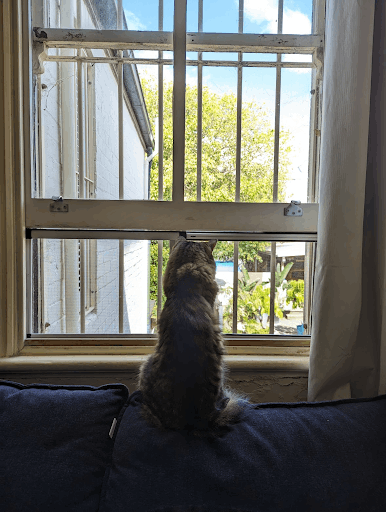Separation anxiety


Does your pet worry about you leaving? Do they try to stop you walking out the door? Have you heard them continuously barking from the other end of the street? Do you come home to accidents inside or the floor covered in drool? Is your pet super excited to see you when you get home? If you answered yes to any of these questions, your pet might be experiencing separation anxiety. With over a quarter of the dog population, and at least 20% of the cat population feeling the same, you are not alone in this.
We choose to share our lives with pets for the friendship they provide. These animals have been carefully selected over centuries to thrive on our company, and be loving members of our families. Unfortunately this high social drive can also lead to some distressing situations for our pets.
Separation anxiety is the term given to the state of fear and panic experienced by some dogs and cats on separation from their beloved human companions. These animals experience strong feelings of grief at departure, or even the thought of departure, pushing them out of their “thinking” brain and into their “danger” brain. The behaviour these animals then express is reflexive, some are in a way designed to reunite them with their human guardians, while others are unconscious expressions of distress.
There are a number of reasons why animals develop separation anxiety. Genetics, personality type, past experiences, and current emotions all contribute to how an animal handles different situations. But regardless of the cause, it is important to accept your pet for who they are and take steps to improve their life.
It is important to remember that this is an anxiety disorder and isn’t just about a lack of practice or the animal needing to get used to being alone. By continuing to expose your pet to the cues associated with departures without careful management of their emotional state, we risk further traumatising them.
These pets feel strong connections to their human companions, and experience true physiological panic during periods of isolation from their beloved people. In many cases, they may not be satisfied with the company of another animal during these periods of separation, as the emotions are associated with the absence of their caregiver, not isolation itself.
There are a lot of myths and misconceptions about separation anxiety that create barriers to people reaching out for support. Crucially, nothing you have done has caused this problem, but there are steps you can take to alleviate the stress felt by your pet. We can work with you to understand exactly what is happening, and create a plan to help your pet cope with the stress of being separated from you.